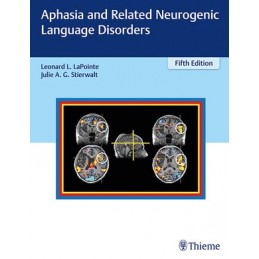- Obniżka


 Dostawa
Dostawa
Wybierz Paczkomat Inpost, Orlen Paczkę, DHL, DPD, Pocztę, email (dla ebooków). Kliknij po więcej
 Płatność
Płatność
Zapłać szybkim przelewem, kartą płatniczą lub za pobraniem. Kliknij po więcej szczegółów
 Zwroty
Zwroty
Jeżeli jesteś konsumentem możesz zwrócić towar w ciągu 14 dni*. Kliknij po więcej szczegółów
Aphasia and Related Neurogenic Language Disorders
Rapid advances in neural imaging, particularly in regard to neural plasticity and brain changes, have resulted in an evolving neurorehabilitation paradigm for aphasia and related language disorders. Aphasia and Related Neurogenic Language Disorders has been adopted worldwide as a text for aphasia courses. This new 5th edition by Leonard LaPointe and Julie Stierwalt encompasses state-of-the-art concepts and approaches from an impressive cadre of experts who work in research labs, classrooms, clinics, and hospitals-including the world-renowned Mayo Clinic.
As in previous editions, this book embraces a humanistic approach to treatment, addressing multicultural and multilinguistic considerations and social model interventions. The text encompasses a full continuum of cognitive-language disorder management-from everyday practicalities, assessment, and treatment to disorder-specific cases with evidence-based data. Additions to the 5th edition include chapters on pragmatics and discourse, telepractice, digital and electronic advances, funding and reimbursement, and comprehension, syntax, and linguistic based disorders.
Key Features::
This is the most comprehensive yet concise resource on aphasia and related disorders available today. New legions of speech language pathology students, residents, course directors, and practitioners will discover a remarkable guide on the treatment of communication disorders.
Opis
Section I: Foundations and Practicalities
1. Brain Basics
2 Humanistic Basics: Accommodation, Adjustment, and Aristos
3. Aphasia Theory, Models, and Classification
4. Neuroimaging and Brain-Based Communication Disorders
5. Care for People with Aphasia and Related Neurogenic Communication Disorders in Acute Hospital Settings
6. Multicultural and Multilinguistic Issues
Section II: Assessment and Treatment
7. General Principles of Assessment
8. Naming and Word Retrieval Impairments
9. Comprehension
10. Acquired Impairments of Reading and Writing
11. Syntax and Linguistic-Based Approaches
12. Pragmatics and Discourse
13. Social and Life Participation Approaches to Aphasia Intervention
14. Assistive Technology
15. Treatment Effectiveness and Evidence-Based Practice
16. Telepractice
17. Digital and Electronic Advances in the Management of Aphasia and Related Neurogenic Language Disorders
18. Resources for Families and Clinicians
19. Funding and Reimbursement of Speech-Language Services
Section III: Related Cognitive-Language Disorders
20. Primary Progressive Aphasia
21. Communication Disorders Associated with Right Hemisphere Brain Damage
22. Dementia
23. Traumatic Brain Injury, Blast Injuries, and Multisystem Injuries
24. Communication and Cognition
Indeks: 35600
Autor: Jackson C. Tan
Diagnostics, Therapeutics and Basic Problems
